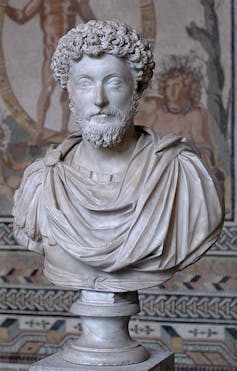Stoicism may be experiencing a resurgence. For centuries, this ancient philosophy, which originated in Greece and spread throughout the Roman Empire, was considered more or less extinct; the word “Stoic” has persisted as shorthand for an emotionless person. But today, with the help of the internet, Stoicism is gaining momentum; one of the largest online communities, The Daily Stoic, claims to have more than 750,000 email subscribers.
Perhaps that’s not so surprising: America’s current political climate resembles that of ancient Rome in the centuries BCE, home to some of the most famous Stoic philosophers, including the former slave philosopher Epictetus and Emperor Marcus Aurelius. During this time of uncertainty, including the collapse of the Roman Republic, Stoic philosophy helped its practitioners find community, meaning, and peace.
Even today, society faces widespread feelings of isolation, depression, and anxiety, while more people are looking for answers outside of mainstream religions: 21% of Americans now identify as unreligious, according to a 2022 Gallup Poll.
Capitalizing on the resurgence of interest in Stoicism, I designed a college philosophy class that addresses both theory and practice, and when I ask students why they took it, I hear not only a genuine interest in the subject but also a desire to find meaning, purpose, and personal development.
Basic principles
Ancient Stoicism aspired to be a complete philosophy encompassing ethics, physics, and logic, but most modern Stoics focus primarily on ethics and typically adopt the four principles of Stoicism.
The first is that virtue is the only or highest good, and includes the cardinal virtues such as wisdom, temperance, courage, and justice. Other things than virtue – wealth, health, reputation, and so on – may be nice to have, but they do not directly contribute to human flourishing.

Bibi Saint-Pol/Glyptothek/Wikimedia
Second, humans should live in accordance with nature and reason. This principle reflects the Stoic belief that the universe exhibits a rational order, and we should align our beliefs and actions with eternal principles. Living in accordance with nature reveals the interconnectedness of all things and shows humans to be part of a greater whole.
Third, humans can only control their own actions, not external events. Epictetus explains this dichotomy in the opening words of the Enchiridion, a collection of Epictetus’ core teachings compiled by his student Arrian: “We can control our opinions, pursuits, desires, aversions, and, in a word, our own actions. We cannot control our bodies, our possessions, our reputations, our commands, and, in a word, what is not our own actions.”
The fourth principle is that our thoughts about external events are often the source of our dissatisfaction and distress. This idea has influenced modern cognitive behavioral therapy. This idea, too, comes directly from Epictetus: “Men are not disturbed by things themselves, but by the principles and concepts they form about them.”
Taken together, these principles form the foundation of modern Stoicism, which aims to provide a coherent philosophy of life. The aim of Stoicism is that once practitioners accept that they cannot fully control the things they do, they begin to increase resilience and reduce anxiety. Not only are each individual the architect of their own emotional life, but people can shape their own judgments in ways that lead to greater inner peace.
Stoicism in Practice
In his Sermons, Epictetus makes it clear that study alone is not enough. To become virtuous, we must combine study with practice. “In theory, nothing prevents us from deriving the results of what we have been taught,” he points out. “But there are many things in life that can throw us off course.”
In other words, philosophy is not only an intellectual endeavor, but also a practical and spiritual one: a way of life designed to lead its practitioner to the Stoic conception of the good. Learning to cultivate the core principles of Stoicism requires specific spiritual training.
In my classes, I incorporate a variety of these exercises to help students experience Stoicism in action. One of them, called the “view from above,” encourages practitioners to imagine a bird’s-eye view of their lives or particular situations and recognize the insignificance of their current problems.
The other is “negative visualization,” which involves picturing the loss of something we value. Rather than worrying about the loss, we intentionally meditate on the loss with the intention of cultivating gratitude and contentment. When doing this exercise in class, students imagined the loss of a possession, a scholarship, or even a beloved pet.

Boston Public Library’s John Adams Library/Aristeas/Wikimedia
The third method is to keep a diary and plan and reflect on your day. By reflecting on your thoughts and actions, you can make a more objective and rational judgment as to whether you are living up to your beliefs.
Once practice is combined with theory, Stoicism can become a kind of spiritual project. Epictetus wrote, “As wood is the carpenter’s material, and bronze the sculptor’s, so the art of living has as its material the life of each individual.”
Procopton’s Way
So what does it mean for someone who practices Stoic philosophy, or “prokopton” in Greek?
For both ancient and modern practitioners, Stoicism is not just a collection of abstract concepts; it is a set of guidelines that permeate every aspect of life. The goal is progress, not perfection. People are encouraged to explore Stoic ideas alongside others.
Currently, there are at least three relatively active Stoic communities online: The Daily Stoic, Modern Stoicism, and College of Stoic Philosophers.
Stoicism has undeniable similarities to many mainstream religions, including a committed community, a guiding framework, and a distinctive spiritual discipline. For those seeking such, Stoicism may be an alternative or complement to mainstream religions. Modern people tend to be unconvinced by Stoicism’s original ideas on physics and theology, but apart from those ideas, the core principles of modern Stoicism are accessible to those who identify with modern faith traditions, or none at all.
The ancient Greeks believed that a philosophy of life was essential for human flourishing. They were concerned that without a guiding spirit, individuals would likely lead unstructured and unproductive lives, pursue superficial pleasures, and feel that life lacked purpose. Stoicism offered some people then, and still does today, a path to follow.

